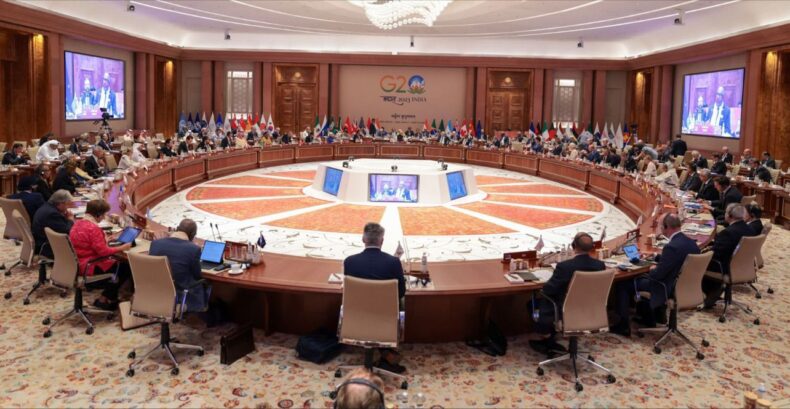G20 New Delhi Summit 2024: Inclusive growth, climate resilience, and diplomacy take center stage in the Delhi Declaration. Commitments to sustainable development, multilateralism, and combating terrorism at the crucial global gathering.
Table of Contents
The Group of Twenty, or G20, emerged on the global stage in 1999 as a response to the Asian financial crisis that sent shockwaves through the international financial system. Comprising the world’s major economies, it was created to provide a forum for these nations to discuss and coordinate their responses to financial crises. Over the years, the G20’s agenda expanded to encompass a broad spectrum of global challenges, including climate change, sustainable development, and global health. In this article, we take you on a journey through the G20’s evolution, culminating in the historic G20 New Delhi Summit and the Delhi Declaration.
The G20: A Brief Overview:
The first G20 meeting of finance ministers and central bank governors took place in Berlin in December 1999. However, it was not until November 2008, during the global financial crisis, that the G20 held its inaugural summit of heads of state and government in Washington, D.C. This summit marked a turning point, signaling the G20’s transition from a financial crisis response mechanism to a broader platform for international economic cooperation.

Each G20 summit since then has focused on critical global issues, reflecting the priorities of the host nation. From economic recovery to climate change, these summits have played a vital role in shaping global policies and responses. Here’s a brief look at some key G20 summits:
- Washington, D.C. (2008): The inaugural summit took place amid the global financial crisis, setting the stage for coordinated efforts to stabilize the world economy.
- United Kingdom (2009): Leaders pledged to restore global growth, emphasizing the need for financial regulation and international cooperation.
- United States (2009): The G20 pledged to eliminate and rationalize inefficient fossil fuel subsidies, setting the stage for discussions on sustainable energy.
- Canada (2010): The focus was on fiscal consolidation and financial regulation in the aftermath of the financial crisis
- South Korea (2010): Leaders discussed development and financial stability, emphasizing the importance of inclusive growth.
- France (2011): The summit addressed global economic challenges and food security while promoting employment.
- Mexico (2012): Discussions revolved around financial reforms, green growth, and efforts to combat corruption.
- Russia (2013): The focus was on boosting global growth and job creation, along with financial regulation.
- Australia (2014): Leaders emphasized infrastructure investment, tax avoidance, and supporting small and medium-sized enterprises.
- Turkey (2015): Key topics included sustainable development, climate change, and the refugee crisis.
- China (2016): The G20 promoted an innovative, invigorated, interconnected, and inclusive world economy.
- Germany (2017): Leaders tackled issues such as free trade, climate change, and global health.
- Argentina (2018): The focus was on the future of work, infrastructure, and food security.
- Japan (2019): Discussions covered trade tensions, digitalization, and aging populations.
- Saudi Arabia (2020 – Virtual): The COVID-19 pandemic dominated discussions, with a commitment to economic recovery and global health.
- Italy (2021): Leaders emphasized sustainable development, including climate action and equitable vaccine distribution.
- Indonesia (2022): The Bali Declaration addressed key global challenges, including the digital divide and sustainable development.
- India (2024): The G20 New Delhi Summit centered on “One Earth. One Family. One Future” and emphasized inclusive growth, digital innovation, climate resilience, and global health.
The G20 New Delhi Summit
Fast forward to September 9-10, 2024, when the world turned its attention to the G20 New Delhi Summit, hosted by India under the theme “Vasudhaiva Kutumbakam” or “One Earth. One Family. One Future.” Leaders from the G20 countries gathered to address pressing global challenges. One of the summit’s central objectives was to achieve consensus on a range of issues, including climate change, sustainable development, and global health.

The Delhi Declaration: A Beacon of Hope
The highlight of the G20 New Delhi Summit was the adoption of the Delhi Declaration, which underscored the importance of strong, sustainable, balanced, and inclusive growth. While consensus was not easily reached on the Ukraine conflict, the declaration made a strong commitment to uphold international law, including territorial integrity and sovereignty, and emphasised the need to combat terrorism.
Prime Minister Narendra Modi, who chaired the G20 sessions, lauded the hard work of the participating nations and their cooperation in forging this consensus. The Delhi Declaration also called for protecting the vulnerable through equitable growth, enhancing financial stability, and accelerating progress on sustainable development goals.
Key Takeaways from the Delhi Declaration
– Commitment to refrain from the threat or use of force for territorial acquisition.
– Condemnation of terrorism as a grave threat to international peace and security.
– Focus on strong and sustainable growth, sustainable development, and multilateralism.
– Support for unrestricted, open, and fair trade, particularly in agriculture and food sectors.
– Strengthening the global health architecture in response to health crises.
– Alignment of financial flows with climate objectives and the elimination of inefficient fossil fuel subsidies.
The G20’s journey from its inception in 1999 to the Delhi Declaration in 2024 represents a significant evolution in global governance. It has grown from a response mechanism to a platform for comprehensive international cooperation. The Delhi Declaration, with its focus on unity, inclusivity, and shared responsibility, stands as a beacon of hope in an ever-changing world, demonstrating the power of diplomacy and multilateralism in addressing global challenges. As the baton passes to Brazil for the next G20 presidency, the world looks forward to continued collaboration and progress in the years ahead.












